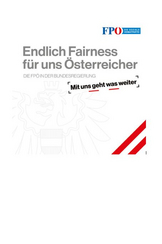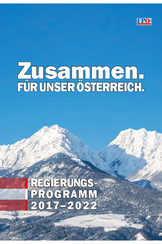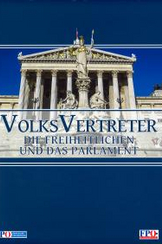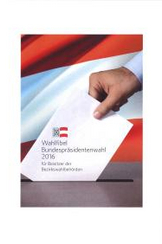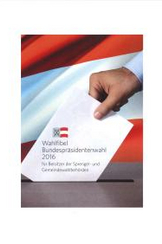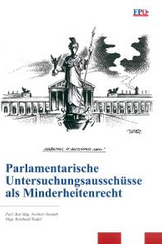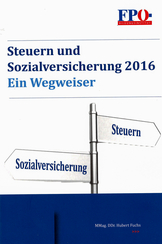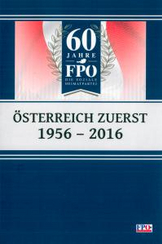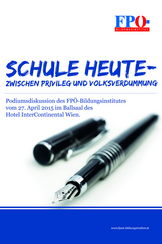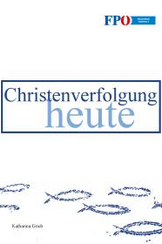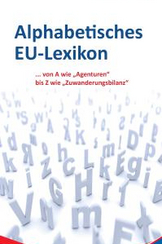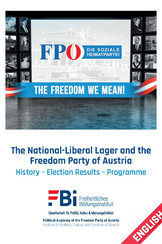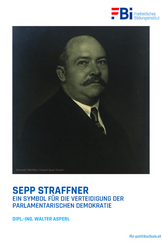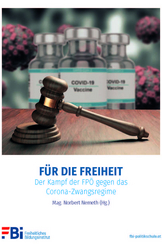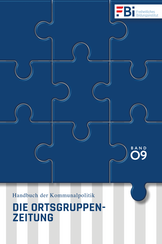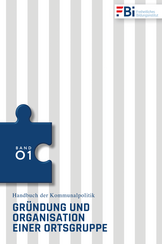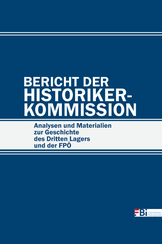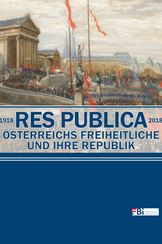BOOKS AND BROCHURES
Published by the Political Academy of the Freedom Party or edited in cooperation with us. Only available in German.
Taxes and Social Security 2017
Compact Information
Compulsory military service 2016
Elected Representatives
Committees of inquiry as a minority right
Taxes and Social Security 2016
Austria First: 1956 - 2016
FPÖ Women Initiative: End of gendering
Life after paraplegia
Alphabetical EU encyclopaedia
The Freedom, we mean!
The National-Liberal Lager and the Freedom Party of Austria: History – Election Results – Programme
The brochure “The Freedom We Mean! The National-Liberal Lager and the Freedom Party of Austria. History - Election Results - Program” provides an English-language overview of the history of the Freedom Party, election results, federal party leaders and party program. The brochure is available in an updated edition of 2025.
Click HERE for the electronic version
You can order the brochure using the order button below:
Cash and the digital Euro – Where are we headed?
"Cash is King"
This publication highlights the central importance of cash for individual freedom and economic self-determination, warns of the dangers of a digital surveillance state and places the cash debate in the context of fundamental rights and freedoms. It is a compact source of information for anyone who wants to form their own opinion on the future of money and the euro in particular.
You can access the digital version here.
You can order the book free of charge by clicking on the order button:
Taxes and social security 2025
A Guide
The author of this updated guide, Hubert Fuchs, is the Freedom Party's spokesperson for finance and tax law in the National Council. He is considered a proven tax expert and was a former State Secretary in the Federal Ministry of Finance.
The first part of the book covers topics such as income tax, corporate tax, and sales tax law, tax deadlines, tax office interest, accounting requirements, the Gift Reporting Act, the Real Estate Transfer Tax Act, and international tax law. The tax treatment of the most important COVID-19 benefits and grants is also addressed. The second part covers social security for employees and self-employed persons, as well as labor law information, non-wage labor costs, and wage garnishment values.
This guide is intended to provide initial orientation in the jungle of tax laws. It is in no way a substitute for expert advice.
The full electronic version in German can be found here.
You can order the book free of charge using the order button:
SEPP STRAFFNER
A symbol of the defense of parliamentary democracy
The history of the First Republic is a chapter that is often overshadowed by the two world wars in public perception. The period in between, which was characterized by ideological struggles, political experiments and the search for a stable order, often fades into the background. In particular, the “Third Camp”, which played a crucial role within the political landscape of the First Republic, receives little public attention. However, anyone who wants to understand the “Third Camp” as one of the most important political movements in the Republic of Austria must look at its history in its entirety.
This book makes a valuable contribution to this. It is dedicated to Dr. Sepp Straffner, an important representative of the “Third Camp” of the First Republic. He was a member of the National Council for ten years and was the third President of the National Council until its dissolution in 1933. His work as a politician and his commitment to democracy in Austria deserve an appropriate historical assessment. In this book, Straffner's CV and, above all, his political career are recorded and analyzed in detail. In particular, his commitment to parliamentarism and his efforts against authoritarian developments towards the end of the First Republic are examined in detail in this context.
Here you can browse the publication online - only avaliabe in German.
You can order the book for free using the button below.
Artificial intelligence
... and its influence on our society, economy and politics
The rapid development of artificial intelligence (AI) is poised to fundamentally change our lives in the next few years. What's more, it has already changed it significantly without large parts of the population taking notice. A small circle of “initiates” is currently faced with a broad mass of people who still have little idea what to do with the new technology. This urgently needs to change.
In a world that is increasingly characterized by algorithms and automated decision-making processes, it is the duty of politicians to sharpen our focus on the opportunities and dangers of this technology. This book offers a comprehensive analysis of artificial intelligence and its influence on our society, economy and politics.
HERE you can browse the publication online - only available in German.
You can order the German language book for free using the button below.
About center-right coalitions
... "firewalls" and political discouragement
This book provides an overview of the potential of center-right governments. It examines the past in Austria and the present in other European countries and defines the focal points. A new dividing line is also highlighted that seems more important than the orientation towards socialism or capitalism: Left-wing parties are increasingly looking for their target audience in an immigrant milieu that is rapidly growing due to mass immigration, while right-wing parties, as patriots, align their politics with the traditional population and citizens.
The publication also addresses current questions: Should election results be recognized and a government based on voters' preferences be formed? Is it democratic to declare opinions other than one's own to be undemocratic? Does the term “political center” mean that the democratic spectrum to the left and the right is equally part of democracy? And: Why do those who build firewalls against right-wing political forces consciously restrict the democratic spectrum?
The publication aims to provide insights into forms of political power distribution and historical development at national and international levels, as well as to promote and further develop analytical and critical thinking and a comprehensive understanding of democracy.
You can browse the German language publication online here.
Für die Freiheit
For Freedom
This book not only contains an in-depth analysis of Corona policy. It is also intended as an appeal for society to come to terms with this dark time and as a stark warning against its repetition. The essays describe how a broad coalition of civil resistance was able to put a stop to an unprecedented series of encroachments on fundamental rights and freedoms. Parliamentary initiatives, legal steps, but also rallies and demonstrations by concerned people from all walks of life are recalled. Despite the many aspects that the anthology takes up, it leads the reader to a number of overarching conclusions, namely: that democracy requires responsible citizens, that the rule of law and democracy are interdependent, and that democracy cannot exist without pluralism. This brochure, written competently and entertainingly by experts in their field, makes a significant contribution to civic education.
You can find the full electronic version in German language here.
You can order the book free of charge using the order button:
Wahlfibel Nationalratswahl 2024
Election Guide National Council Election 2024
Elections are the heart of democracy. And democracy thrives on the active participation of citizens. This participation extends not only to those people who go to the ballot box, but above all to those who, through their responsible work as assessors, make the elections possible in the first place. We would like to help them with this publication.
You can find the full electronic version here.
You can order the book free of charge using the order button:
Wahlfibel Europawahl 2024
Election Guide European Elections
Elections are the heart of democracy. And democracy thrives on the active participation of citizens. This participation extends not only to those people who go to the ballot box, but above all to those who, through their responsible work as assessors, make the elections possible in the first place. We would like to help them with this publication.
You can find the full electronic version here.
You can order the book free of charge using the order button:
Steuern und Sozialversicherung 2024
Taxes and Social Security
The author of the updated guide "Taxes and social insurance 2024. A guide", MMag. DDr. Hubert Fuchs, is the Freedom Party's finance and budget spokesman in the National Council. He is considered a proven tax expert and was State Secretary in the Federal Ministry of Finance. The first part of the book covers, among other things, income tax, corporate tax and sales tax law, deadlines in tax law, tax office interest, accounting obligations, gift reporting law, real estate transfer tax law and international tax law. The tax treatment of the most important COVID-19 grants or COVID-19 subsidies is also taken into account. The second part deals with social insurance for employees and self-employed persons as well as information on labor law, non-wage labor costs and wage garnishment values.
The guide is intended to provide initial orientation in the jungle of tax laws. It is in no way intended to replace expert advice.
You can find the full electronic version in German language here.
You can order the book free of charge using the order button:
Bargeld und Digitaler Euro
Cash and Digital Euro
In our social and economic order, cash is a fundamental cornerstone for the economic and thus individual freedom of the individual. Only those who can independently dispose of their income and assets at any time and in any place are able to act independently of state surveillance and financial interventions. By publishing this publication, which examines the topic from the perspective of fundamental rights and freedoms and the prevention of a digital surveillance state, the Freedom Education Institute is making a contribution to ensuring that individual citizens receive basic information so that they can form their own picture of the dangers of a possible abolition of cash.
You can find the full electronic version in German language HERE.
You can order the book free of charge using the order button:
60 Jahre Wehrpolitik der FPÖ
60 Years of FPÖ Defense Policy
1.126 / 5.000With the book "60 Years of the FPÖ's Defense Policy", the Freedom Party Education Institute is publishing a work on the party's history and the Freedom Party's commitment to the Austrian Federal Army. The first part of the chronicle examines the history of the Austrian Federal Army from 1945, when the first steps towards an Austrian Federal Army were taken after the end of the war and demobilization. The various chapters deal with, among other things, the first foreign missions of the Federal Army, the first ideas for a concept of comprehensive national defense and the deployment of the Federal Army in the event of natural disasters at home. The focus of the publication is the scientific elaboration of the FPÖ's defense policy and the Freedom Party's defense concepts, starting with the VdU concept. The following section discusses, among other things, the first FPÖ party program with a commitment to the right to national defense, the first-time formation of an FPÖ defense committee, and the FPÖ's participation in government with liberal defense ministers.
For the full electronic version in German language, click here.
You can order the book free of charge using the order button:
Steuern und Sozialversicherung 2023
Taxes and Social Security 2023
Der Verfasser des aktualisierten Leitfadens "Steuern und Sozialversicherung 2023. Ein Wegweiser", MMag. DDr. Hubert Fuchs, ist freiheitlicher Finanz- und Budgetsprecher im Nationalrat. Er gilt als ausgewiesener Steuerexperte und war Staatssekretär im Bundesministerium für Finanzen.
Im ersten Teil des Buches werden unter anderem Einkommensteuer-, Körperschaftsteuer- sowie Umsatzsteuergesetz, Fristen im Steuerrecht, Finanzamtszinsen, Buchführungspflicht, Schenkungsmeldegesetz, Grunderwerbsteuergesetz und internationales Steuerrecht behandelt. Die steuerliche Behandlung der wichtigsten COVID-19-Zuwendungen bzw. COVID-19-Zuschüsse wird ebenfalls berücksichtigt. Im zweiten Teil geht es um die Sozialversicherung für Unselbstständige und Selbstständige sowie um arbeitsrechtliche Informationen, Lohnnebenkosten und Lohnpfändungswerte.
Der Leitfaden soll eine erste Orientierung im Dschungel der Steuergesetze ermöglichen. Eine fachkundige Beratung soll dadurch keinesfalls ersetzt werden.
Zur vollständigen elektronischen Version kommen Sie hier.
Sie können das Buch über den Bestell-Button kostenlos beziehen:
Manual of Local Politics - Supplementary volume 1
Preparing for a blackout in your community
Das Handbuch der Kommunalpolitik ist ein Leitfaden für die politische Praxis auf kommunaler Ebene. Es soll Menschen, die sich der Kommunalpolitik verschreiben, dabei helfen, ihre ehren- oder hauptamtlichen Aufgaben möglichst erfolgreich zu erfüllen. In praxisorientierten, didaktisch aufbereiteten Einzelbänden widmet es sich den wichtigsten Themen in der Kommunalpolitik.
Im Zusatzband eins des Handbuchs der Kommunalpolitik Blackout-Vorsorge auf kommunaler Ebene erhalten Sie als Gemeindepolitiker konkrete Tipps, wie Sie sich und ihre Gemeinde am besten auf Situationen vorbereiten können, in denen die vertrauten Dinge und Einrichtungen nicht mehr funktionieren - weil zum Beispiel der Strom über einen längeren Zeitraum ausfällt. Auch Kriminalitätsvorbeugung oder der Umgang mit gesundheitlichen Notfällen sind Themen, die mit dem nötigen Wissen besser bewältigt werden können.
Das Handbuch ist von Praktikern für Praktiker geschrieben und zeichnet sich unter anderem durch anwendungsorientierte Checklisten und effektive Tipps aus.
Zur vollständigen elektronischen Version kommen Sie hier.
Manual of Local Politics - Volume 10
Social Media
The Handbook of Local Politics is a guide to political practice at the local level. It is intended to help people who are committed to local politics to fulfill their voluntary or full-time tasks as successfully as possible. In ten concise, practice-oriented, didactically prepared individual volumes, it addresses the major topics of local politics.Volume ten of the Handbook for Local Politics deals with the proper use of social media. Here, content is communicated directly and unfiltered, and the focus is on information, interaction and participation. For local politicians, social platforms are suitable for positioning themselves and raising their profile, but also for information and education, networking with like-minded people and addressing new target groups and potential voters. The individual chapters deal with blogs, YouTube, Facebook, Instagram, Twitter and Tik-Tok, and address the selection of the appropriate channels in each case, the dangers and risks on the web, and the opportunities and possibilities that open up for local politicians in this area.The handbook is written by practitioners for practitioners and features, among other things, application-oriented checklists and effective tips.
Manual of Local Politics - Volume 9
Local party newspaper
The Handbook of Local Politics is a guide to political practice at the local level. It is intended to help people who are committed to local politics to fulfill their voluntary or full-time tasks as successfully as possible. In ten concise, practice-oriented, didactically prepared individual volumes, it addresses the major topics of local politics.Volume nine of the Handbook for Local Politics deals with the production of a popular local party newspaper that appeals to every age group on the one hand and on the other hand does justice to the trend that "screen workers" like to return to the paper newspaper in private. The likelihood that a party newspaper will be read where almost "everyone knows everyone" is relatively high. People are curious about what politicians they know and the parties do and write, look at photos and are happy to see familiar faces, and discuss well-crafted articles at the regulars' table. That's why this volume deals with content, layout, planning, text creation and image presentation, press law and newspaper financing.The handbook is written by practitioners for practitioners and features, among other things, application-oriented checklists and effective tips.
Manual of Local Politics - Volume 8
After the election is before the election
The Handbook of Local Politics is a guide to political practice at the local level. It is intended to help people who are committed to local politics to fulfill their voluntary or full-time tasks as successfully as possible. In ten concise, practice-oriented, didactically prepared individual volumes, it addresses the major topics of local politics.Volume eight of the Handbook for Local Politics deals with the phase directly after the election. Depending on the election results, representatives of local politics are faced with the question of how to behave and position themselves. If an election success was achieved, it is important not to be arrogant, to analyze the election results and to present the goals and projects for the new municipal council period, as well as to increase membership recruitment. If the election has ended unpleasantly, it is important to keep one's composure, to analyze the election results in internal circles, and to draw meaningful conclusions and insights from them.The handbook is written by practitioners for practitioners and features, among other things, application-oriented checklists and effective tips.
Manual of Local Politics - Volume 7
Electioneering
The Handbook of Local Politics is a guide to political practice at the local level. It is intended to help people who are committed to local politics to fulfill their voluntary or full-time tasks as successfully as possible. In ten concise, practice-oriented, didactically prepared individual volumes, it addresses the major topics of local politics.Volume seven of the Handbook for Local Politics deals with the preparation and implementation of an election campaign at the local level. It starts with the timely preparation and planning by the local group officer, from the identification of topics to the preparation of the list of candidates. The activity plan in the election year, including house visits, poster advertising and personalized letters, is covered, as is a professional online presence on the Internet and in social media. Further chapters deal with press relations and the decision-making process for a possible mayoral candidacy.The handbook is written by practitioners for practitioners and features, among other things, application-oriented checklists and effective tips.
Manual of Local Politics - Volume 6
Serving as a local councillor
The Handbook of Local Politics is a guide to political practice at the local level. It is intended to help people who are committed to local politics to fulfill their voluntary or full-time tasks as successfully as possible. In ten concise, practice-oriented, didactically prepared individual volumes, it addresses the major topics of local politics.
Volume six of the Handbook of Local Politics deals with work in the municipal council and how to position oneself as an opposition party. How to exercise active control, expose mayoral party blunders and point out alternative solutions. Themes include how to prepare for meetings in the best possible way, from inspecting files to voting behavior, and how to make the right motions - including motions to extend, amend or add, when it makes sense to use the urgent motion or even the motion of no confidence, and what a supervisory complaint is. In addition, the work in the committees is dealt with, and here very specifically in the audit committee.
The handbook is written by practitioners for practitioners and features, among other things, application-oriented checklists and effective tips.
Manual of Local Politics - Volume 5
Activity plan for local groups
The Handbook of Local Politics is a guide to political practice at the local level. It is intended to help people who are committed to local politics to fulfill their voluntary or full-time tasks as successfully as possible. In ten concise, practice-oriented, didactically prepared individual volumes, it addresses the major topics of local politics.Volume five of the Handbook for Local Politics deals with the tasks and concrete activities of a local group. It guides readers to define annual goals that are as precise, realistic and feasible as possible and to evaluate them at the end of the year. These include regulars' tables, public events, citizens' stands, distribution campaigns and house visits, as well as active participation in public social life. Information about the locality and surrounding area must be actively obtained and passed on to fellow campaigners, direct contact with citizens must be maintained, and structures must be created that are resilient and promising for the party in the election campaign.The handbook is written by practitioners for practitioners and features, among other things, application-oriented checklists and effective tips.
Zur vollständigen elektronischen Version kommen Sie hier.
Manual of Local Politics - Volume 4
Verbal communication and rhetorics
The Handbook of Local Politics is a guide to political practice at the local level. It is intended to help people who are committed to local politics to fulfill their voluntary or full-time tasks as successfully as possible. In ten concise, practice-oriented, didactically prepared individual volumes, it addresses the major topics of local politics.Volume four of the Handbook for Local Politics deals with the three effective means of voice, speech and manner of speaking. It is not only personal manner and charisma that can impress, verbal communication is also of decisive importance for a politician. In a radio broadcast, for example, it is the only means of winning over listeners. The volume Verbale Kommunikation und Rhetorik (Verbal Communication and Rhetoric) deals, among other things, with how to train the voice, how to deal with stage fright, how to decide between dialect and standard language, how to choose words and how to use target-group-specific language, how to deal with volume, speech tempo, speech melody and articulation, and how to shape a speech.The handbook is written by practitioners for practitioners and features, among other things, application-oriented checklists and effective tips.
Manual of Local Politics - Volume 3
Personal conduct and making a good impression
The Handbook of Local Politics is a guide to political practice at the local level. It is intended to help people who are committed to local politics to fulfill their voluntary or full-time tasks as successfully as possible. In ten concise, practice-oriented, didactically prepared individual volumes, it addresses the major topics of local politics.
Volume three of the Handbook for Local Politics focuses on tips for positive civic contacts and professional public appearances. After all, all activists and campaigners are representatives and brand ambassadors of their own party, often the only elected officials and functionaries a citizen ever meets in person. So a local politician is literally the "face" of his or her party. At the same time, it is important to remember that they are often also subject to critical scrutiny and that words and actions can be interpreted adversely. The challenge, then, is to stay politically in line without giving opponents a target through personal misadventures.
The handbook is written by practitioners for practitioners and features, among other things, application-oriented checklists and effective tips.
Manual of Local Politics - Volume 2
Leadership, motivation and team-building
The Handbook of Local Politics is a guide to political practice at the local level. It is intended to help people who are committed to local politics to fulfill their voluntary or full-time tasks as successfully as possible. In ten concise, practice-oriented, didactically prepared individual volumes, it addresses the major topics of local politics.Volume two of the Handbook for Local Politics addresses the challenges of leading a team of volunteers. It describes in very concrete terms the demands placed on a local group chairman or chairwoman and the potential for conflict that one must face in such a position. It is about conflict management and motivational measures, about meaningful and promising leadership strategies and the characteristics of a successful team. And how to create and promote both well-coordinated teamwork and an intact "we" feeling.The handbook is written by practitioners for practitioners and features, among other things, application-oriented checklists and effective tips.
Zur vollständigen elektronischen Version kommen Sie hier.
Manual of Local Politics - Volume 1
Founding and organising a local group
The Handbook of Local Politics is a guide to political practice at the local level. It is intended to help people who are committed to local politics to fulfill their voluntary or full-time tasks as successfully as possible. In ten concise, practice-oriented, didactically prepared individual volumes, it addresses the most important topics in local politics.In volume one of the handbook of local politics foundation and organization of a local group it goes around the need inquiry, whether the establishment of a local group is meaningful, around methods of the self reflection, in order to recognize its own strengths and to define suitable operational areas for a personal commitment, up to over the candidate search and member production. Topics of the guidance problem, possible stumbling blocks on the way to the successful local group, in addition, motivation Tipps, which promote the cohesion of members and functionaries, are addressed. A comprehensive chapter is devoted to the structuring, organization and distribution of tasks of a local group.The handbook is written by practitioners for practitioners and features, among other things, application-oriented checklists and effective tips.
Report of the Commission of Historians
Analysis and materials concerning the history of the Third Camp and the FPÖ
This book is only available in German. You can browse its content online here.
Election Primer for the National Assembly Election 2019
A guide for members/observers of the district election authorities
This book is only available in German. You can browse its content online here.
Election Primer for the National Assembly Election 2019
A guide for members/observers of the parish and municipal election authorities
This book is only available in German. You can browse its content online here.
Concise Manual for Functionaries
Practical tips and tricks for speaking with the citizenry and conducting home visits
This book is only available in German. You can browse its content online here.
The Austrian Freedom Party and the Austrian Republic
On the 100th anniversary of the Republic
The national-liberal camp stood at the cradle of the Republic of German-Austria in 1918 and, as the strongest faction in the Provisional National Assembly, played a major role in the creation of the state. Franz Dinghofer, one of the three presidents of the Provisional National Assembly, proclaimed the Republic from the ramp in front of Parliament on 12 November 1918.
100 years later, in the Republic’s jubilee year, the national liberals once again find themselves in a crucial role as state supporters and, within the context of a centre-right coalition government, are once again involved in key aspects of the Republic.
This book, published by the Educational Institute of the Freedom Party of Austria, to commemorate the 100th anniversary of the founding of the Republic in 2018, is intended to provide an overview of the Republic and of the main features of the relationship between the Republic and the national liberals. It highlights the path of the “liberals and their Republic” over the course of the past 100 years from different points of view.
THIS BOOK IS AVAILABLE ONLY IN GERMAN LANGUAGE.
Click here for the PDF
Finally Fairness for Us Austrians - The FPÖ in the Federal Government
An interim balance sheet of governance
This book is only available in German. You can browse its content online here.
Together. For Our Austria. Government Agenda 2017-2022
A concise version of the government agenda 2017-2022
This book is only available in German. You can browse its content online here.
“Request granted”
Comments on the 2016 presidential elections
Many will remember the presidential elections in 2016 as the longest election of the Second Republic, people in Austria voted three times altogether.
The book describes how the election was challenged and how the second round of elections was cancelled by the Austrian Constitutional Court. This annulment can rightly be considered a victory of the rule of law and democracy. The Constitutional Court dealt with the Liberals’ complaint quickly, carefully and transparently. The judges fulfilled their obligations when they pointed out major breaches of law and also irregularities that enabled manipulations. The ruling helped safeguard the confidence of Austrian citizens in the rule of law.
The authors tried to shed light on the background of this historical election through different approaches and points of view.
Election Vademecum to the Presidential Elections in 2017
for observers of parish or community election authorities
Election Vademecum to the Presidential Elections in 2017
for observers of district election authorities
Taxes and Social Security 2017
A guide
Austria currently suffers from the highest tax burden in the history of the Second Republic. Even internationally, Austrian tax rates have earned us a top place in Europe, and the two ruling parties, the SPÖ and ÖVP, are responsible for this.
These guidelines, drawn up under the leadership of the speaker for finances of the Liberal group in Parliament, Member of the National Council Dr. Hubert Fuchs, will make it easier to navigate in the jungle of legal developments. Of course, it may, and should, not substitute for expert tax advice.
Compact Information
The Freedom Party: History, Programme, Organisation, Contacts
As a citizen interested in politics you cannot help coming across all sorts of questions about the organisation and the programme of the FPÖ. For example:
· How has FPÖ developed in history?
· What is the FPÖ’s organisational structure?
· How is the Party structured at federal and state level?
· Which bodies in the FPÖ decide on what?
· What are the key points of the liberal party programme?
· Where are the contact points at federal and state level?
This brochure strives to give clear and succinct, i.e. compact, answers to these and similar questions. The focus is on being easy to understand with clear graphics.
The brochure is also available online.
Compulsory military service 2016
Turnaround in the army or one-off effect?
The third book in this series has now been published, which is intended to strengthen the conscription and defensive readiness of our republic. The first two volumes “Compulsory military service - Input for current debate” and “Compulsory military service 2014 - One year after the referendum” are already out of print.
Elected Representatives
The FPÖ and the Parliament
After the 2006 elections to the National Council, the Freedom Party returned to parliament with 21 seats under their party chairman and current parliamentary fraction leader Heinz-Christian Strache. After the implosion of the FPÖ as a result of the events at Knittelfeld and the Haider spin-off of the BZÖ, the FPÖ – considered doomed – recovered impressively in order to continue its many years of work in the Parliament. After the new beginning in 2006, the National Council elections of 2008 and finally those of 2013 came, with the Freedom Party becoming the strongest opposition party in the Republic with a good 20 percent of the votes and a parliamentary fraction of 40 members.
Fraction leader and Federal Party Chairman Heinz-Christian Strache and his two Secretary Generals Herbert Kickl and Harald Vilimsky, supported by Fraction Director Norbert Nemeth, the two Presidents of the National Council Martin Graf and subsequently Norbert Hofer, as well as many influential parliamentary personalities made the FPÖ and the FPÖ Parliamentary Fraction the driving political force of the country during this decade.
In these years, the FPÖ once again distinguished itself as a control party - parliamentary inquiry committees chaired by or at least decisively determined by the FPÖ made this very clear. No other fraction has made so many requests and motions, and, in addition to parliamentary democracy, has argued for more democracy. Ten years later, 38 members of the National Council, 13 members of the Federal Council and four members of the European Parliament make up this FPÖ parliamentary fraction, up from 21 MPs in 2006. They are representatives of the people in the truest sense of the word.
But anyone who wants to judge the work of today's FPÖ parliamentary fraction must also shed light on the parliamentary work of the preceding decades: the era of Jörg Haider, the time of Norbert Steger and the era of Friedrich Peter are of great importance for Austrian parliamentarianism. The parliamentary work of the national-liberal camp in the interwar period is a proud tradition of the party. And the development of the rule of law, the constitutional state and parliamentarianism in the Habsburg monarchy are also merits of this national-liberal movement. And all this began in Frankfurt's St. Paul’s Church, the mother of all German parliaments.
Election Vademecum to the Presidential Elections in 2016
for observers of district election authorities
Election Vademecum to the Presidential Elections in 2016
for observers of district election authorities
Committees of inquiry as a minority right
A documentation of the struggle for this parliamentary control instrument
The agreement reached in the Austrian National Council in 2015 to establish the parliamentary committee of inquiry as a minority right is regarded by many as a "milestone" that underlines the eminent importance of democratic policy.
At first, this law made the Hypo Committee of Inquiry possible. In this respect it seemed logical to record this in a book, which FPÖ parliamentary fraction director Norbert Nemeth and office managers HC Strache and Reinhard Teufel did as a group of authors.
In this work, now published by the FPÖ Education Institute, the authors try to build a bridge, from the beginnings in the Constitutional Convention through the media discussion of opinion-makers and decision-makers of this republic to the programmatic reflection in the position papers of the parliamentary groups represented in the National Council. In addition, the legal situation in the individual federal states is presented and compared.
Renowned constitutional law expert Andreas Hauer emphasises in the preface to the book: "Norbert Nemeth and Reinhard Teufel have extensively and knowledgeably documented the long struggle for the minority right to set up parliamentary committees of inquiry and embedded this in numerous interactions.”
Nemeth and Teufel show that in parliamentary systems of governance, in which the government has a majority in parliament, control rights can only be effectively used if they are also available to a minority - or the majority is prepared to allow control.
They point out that the most important task of Parliament remains legislation. "Nevertheless, it had to be ensured that effective instruments were also made available for parliamentary control over the activities of the government and administration," the authors said. This would ensure the “quality of government processes in the most comprehensive sense”, which the outgoing Federal President Heinz Fischer had once demanded.
Taxes and Social Security 2016
A guide
The tax reform adopted by the red-black federal government entered into force in January 2017. The joy of many people seeing a higher net amount in their bank statements left from their gross income was soon overshadowed by the realisation that this was merely a tax policy bluff.
These guidelines, drawn up under the leadership of the speaker for finances of the Liberal group in Parliament, Member of the National Council Dr. Hubert Fuchs, will make it easier to navigate in the jungle of legal developments.
Austria First: 1956 - 2016
60 Years of the FPÖ - the social homeland party
In this publication we look back on the 60-year history of a party and the soon 200-year old history of a political movement. This review of the 60 years of the Freedom Party of Austria begins in the here and now, and goes back in time.
First, we look at the Strache Era, encompassing a good decade from 2005 to 2016. Then there is the time of the government coalition with the People’s Party between 2000 and 2006, which we regard as the second period. Thirdly, we recall the era of the rise of FPÖ under Jörg Haider between 1986 and 2000, which is followed by Chapter 4 on the cooperation in the government under social-democrat Norbert Steger. Then Chapter 5 studies the foundation and inclusion of FPÖ in the political system of the Second Republic between 1956 and 1989. Last but not least we also outline the historical path of the national-liberal camps from their beginning during the Habsburg Monarchy through the tough years of the First Republic right to the foundation of the FPÖ.
FPÖ Women Initiative: End of gendering
.
Equal rights for women and men in all areas of life is a matter of course for the FPÖ. However, this equality has nothing to do with the current, left-wing extremist gender ideology, which keeps blossoming absurdly and whose real goal is to see incapacitated, uniform human beings. The gender doctrine pretends to be for diversity, but ultimately leads to simplicity...
School today
Between privilege and dulling of the people
The FPÖ Education Institute devoted itself to the topic of educational misery in the context of a panel discussion with education experts, the FPÖ education spokesman, National Council member Dr. Rosenkranz, the President of the German Teachers' Association, Josef Kraus, former President of the Vienna School Council, Dr. Scholz, and the new FPÖ education spokesman in the Vienna State Parliament and municipal council Maximilian Krauss.
The pros and cons of introducing the comprehensive school and the new secondary school, the dismantling of the secondary school, the PISA tests and school trials as well as educational policy realities in the school sector were discussed in detail.
The central issue was whether we in Austria were not running the risk of a good education becoming wealth-dependent in the future due to a lack of reforms, but also precisely because of some reforms, such as the introduction of comprehensive schools. If this can no longer be guaranteed in the public school system, mainly due to a lowering of educational standards, private schools become an expensive alternative.
Energy and food
Fundamentals of freedom
As a nature conservation and homeland party, the FPÖ considers it its primary task to ensure an intact environment in Austria and independence from unsafe energy imports for our country. The most important foundations of national sovereignty are self-determination and self-sufficiency in the water, food and energy sectors.
Freedom is our greatest asset. This is the first and most important sentence in the FPÖ party programme. This book makes a small contribution to drawing closer to our freedom in a self-determined homeland.
Persecution of Christians today
Die größte Gruppe aller aus religiösen Gründen Verfolgten.
“Today, some 100 million Christians worldwide are persecuted for their faith. They are the largest group of all those persecuted for religious reasons.” This is what HC Strache writes in his preface to the brochure "Christenverfolgung heute" (Persecution of Christians Today), published by the FPÖ Education Institute at the turn of 2014. The author Katharina Grieb has focused consistently on the realisation of human rights for decades. Since 1985 she has been President of the Austria Section of the International Society for Human Rights (ISHR), which was founded in 1983. Until 2013 she was the first Vice-President of the International Council of this organisation. In her brochure entitled "Persecution of Christians Today" she describes the current situation of Christians around the globe and makes people listen with her descriptions of the dangerous situations Christians are exposed to because of their faith. In the end, you have to ask yourself the question: “Why doesn't the world raise its voice against these brutal acts?”
Life after paraplegia
Mentor for the handicapped and people in need of care
In August 2003, Austrian politician Norbert Hofer had a serious accident while paragliding. He survived, but the cold diagnosis was: spinal paralysis - life in a wheelchair.
Hardly anyone who meets him years later knows his tale of suffering or his wheelchair handling skills.
Eleven years after the accident, this book talks about the long way back, great goals, small steps and the search for new happiness. A must read for all people who believe that a stroke of fate only ever hits others, and a book of hope for those who are confronted with an apparently hopeless situation.
The book also contains a practical guide for those affected and their relatives. How can you plan accessibility, how can you avoid bedsores or to whom can you turn if you need support during nursing care?
Alphabetical EU encyclopaedia
... from A for "agencies" to Z for “Zentralbank” (Central Bank)
The brochure tries to describe the European Union, its institutions as well as European and related Austrian facts and policies in a brief and concise manner, like an encyclopaedia, making them understandable. Of course, this brochure does not claim to be exhaustive. Some representations are deliberately trenchant and will of course meet with protest from some. However, the aim is not to present another "EU Jubilee Brochure", but rather something that is intended to inspire readers to reflect critically.
Thus it is up to the reader to judge whether all the institutions of the European Union in this dimension are really necessary for peace, freedom and democracy, or are not rather counterproductive.
